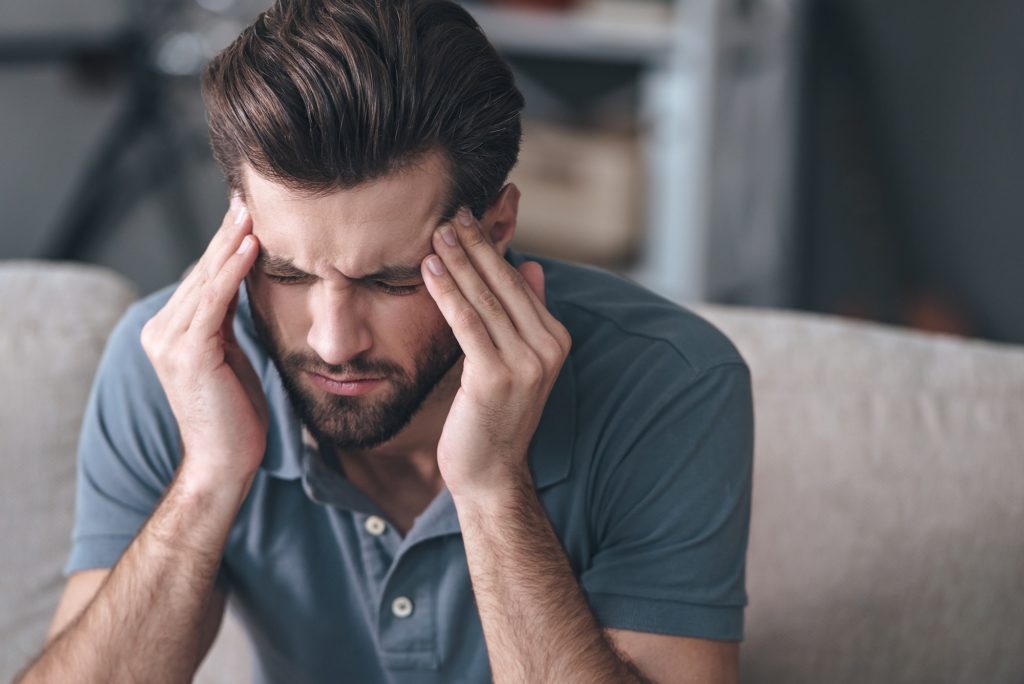How to Stop Clenching Your Jaw

Do you wake up with a splitting headache or a sore face? Does your jaw feel tight, sore, or even lock up, click or pop when you chew? You could be clenching your jaw in your sleep or throughout the day without realizing it.
Table of Contents
Tightness in the jaw can happen for several reasons, including anxiety, stress, bruxism, excessive chewing (like candy and gum), TMJ disorders, and more. A tight jaw can cause discomfort or pain in the ears, nose, head, teeth, jaw, face, and neck. The intensity or severity varies from a dull ache to a constant throbbing, depending on the cause…
More signs you might be clenching your jaw include:
- Limited range of motion when opening your mouth
- Locking of the jaw
- Clicking or popping sounds
Why Do I Clench My Jaw?
There could be many reasons you clench your jaw or grind your teeth. Here are some of the top reasons that can be diagnosed and treated.
1. Temporomandibular Joint Disorders (TMD or TMJ)
Generally, TMD is caused by a dysfunction of the temporomandibular joint. Generally, if you are afflicted with this dysfunction, you will experience pain in the jaw joint and the surrounding muscles. This joint allows you the range of motion needed to chew food, yawn, and speak.
Symptoms of TMD can include:
- Pain or sensitivity in the jaw, face, ear, or neck
- Difficulty chewing
- Difficulty opening the jaw wide
- Constant headaches
- Jaw-popping sounds and feeling
2. Stress & Anxiety
Stress and anxiety are two of the most common causes of muscle tension and jaw clenching. When stressed, you might clench your jaw or grind your teeth (bruxism) during the day or in your sleep without even noticing. After a while, this consistent clenching can cause facial muscles to tighten up. In some cases, clenching and grinding can lead to more serious dental problems like cracked or chipped teeth, wear in enamel, and even loss of teeth.
More signs of stress include:
- Clenching your fists
- Tension in your shoulder and neck muscles
Relief is possible! Keep reading for stress & anxiety relief methods at the end of this article!
3. Teeth Grinding/Clenching (Bruxism)
Bruxism is a common condition in which people clench or grind their teeth. It can happen during the day or at night, and it can cause a variety of problems, including headaches, jaw pain (making it difficult to chew or open your mouth wide), TMD/TMJ, worn-down sensitive teeth (more susceptible to cavities), and broken teeth in severe cases. The exact cause of bruxism is not fully understood, but it is thought to be caused by a combination of factors, including:
- Stress & Anxiety: As mentioned above, stress and anxiety are significant triggers for bruxism. When you are stressed or anxious, your body releases hormones that can cause your muscles to tense up, including the muscles in your jaw.
- Sleep apnea: Sleep apnea is a sleep disorder that causes people to stop breathing for short periods of time during sleep. This can also trigger bruxism.
- Genetics: Some people are more likely to develop bruxism than others, due to genetic factors.
If you think you may have bruxism, it is important to see your dentist or doctor. They can diagnose the condition and recommend the best treatment for you.
4. Tetanus
Tetanus is a potentially fatal bacterial infection that produces toxins that cause painful muscle contractions in a person’s abdomen, neck, and jaw. Tetanus often also includes trouble swallowing. It is highly recommended that you seek immediate medical assistance if you suspect you may have tetanus. Typically this would follow a noticeable injury.
5. Excessive Chewing
Excessive use will cause some pain or discomfort and result in jaw tightness. Like any other joint or muscle in your body, your jaw can suffer fatigue. Always take small bites and give your jaw a rest if it feels sore, tired, or you are experiencing other symptoms.
6. Rheumatoid Arthritis (RA)
RA is an autoimmune inflammatory disorder that affects muscles and joints throughout the human body, including temporomandibular joint inflammation (TMJ). This inflammation of the joint in your jaw can make it difficult or painful to open your mouth. In some cases, it can actually cause damage to the joint and surrounding tissues — unfortunately, even bone loss in the jaw.
Other symptoms of RA include:
- Joint pain
- Joint inflammation
- Joint stiffness
- Tightness of the jaw
- Bumps under the skin of joints
- Fevers
How to Stop Clenching Your Jaw?
1. Use exercises that relax the jaw and facial muscles regularly
Jaw joint stretches and facial exercises can help relieve tightness in the jaw and increase the range of motion. Doing these exercises regularly can help relieve discomfort and prevent further issues and pain in the jaw and facial tissues.
Try these simple exercises:
Exercise 1 – Jaw joint stretch: Rest the tip of your tongue behind your upper front teeth and lower the bottom of the jaw so that the lower teeth move away from the upper teeth. Doing this should help stretch and relieve muscle tightness throughout the jaw and neck.
Exercise 2 – Manual jaw opening: Open and close your mouth several times to warm up. Next, wash your hands and put your fingers on top of your front four bottom teeth and slowly pull down until you feel a small amount of discomfort in the tight areas of your jaw. Hold this position for about 30 seconds if possible, and slowly relax your jaw back to the closed position. Repeat as needed. Beginners may be able to do about 3 repetitions, while regular practice can benefit from up to 12 repetitions.
Exercise 3 – Smile stretch: To eliminate stress and pain in the face, jaw, and neck, try looking in the mirror and smiling as wide as you can without feeling any tightness or pain. While smiling, slowly open your jaw a bit more (roughly 5 cm), take a deep breath, and exhale while relaxing your smile. Repeat this entire process about 10 times.
Exercise 4 – Massage Time: While not technically an exercise for your face or jaw, massaging the affected area can be a workout for your hands! Massaging the jaw can help increase blood flow and reduce muscle tightness in the jaw and surrounding facial tissues. Open your mouth and gently rub the muscles next to your ears on either side of your face in a circular motion. You can easily do this several times a day to help alleviate pain and discomfort.
2. Consider wearing a nightguard or mouthguard
A night guard is a mouthguard designed to prevent discomfort or damage to your teeth from grinding or clenching your jaw in your sleep. Depending on your underlying condition, you may want or need a custom mouthguard. Always consult with your dentist first to avoid causing further pain, discomfort, or even damage by using the wrong type of mouthguard for your condition.
3. A diet to reduce jaw pain and tightness
Jaw tightness and muscle soreness can be partially relieved by eating softer foods, at least temporarily. By putting less strain and pressure on the jaw, you are allowing it time to heal. This is not an instant remedy. Soft foods you could try include apple sauce, yogurt, oatmeal, fruit and veggie smoothies, avocado, and more. If it’s soft and doesn’t require a lot of jaw action to chew, it’s probably a safe option.
Conclusion About Jaw Clenching
Tightness in the jaw muscles or joint is a common occurrence caused by several factors — mainly stress and anxiety — as well as conditions like TMJ, TMD, teeth grinding, and general inflammation. But rest assured that your pain and discomfort when chewing, eating, or even speaking can be easily managed with the simple jaw exercises and stretches noted in this article.
If your jaw pain and symptoms worsen or interfere with your quality of life, make an appointment with your dentist as soon as possible.
Jaw Clenching FAQs
Jaw clenching, also known as bruxism, is characterized by the involuntary clenching or grinding teeth. Though it often happens when sleeping, it can also occur when awake. Jaw clenching often goes unnoticed by the person experiencing it, but it can adversely affect oral health and overall well-being. The pressure exerted on the teeth and jaw joints can lead to tooth wear, jaw pain, headaches, and even temporomandibular joint (TMJ) damage. Stress and anxiety are common triggers for jaw clenching, but misaligned teeth, sleep disorders, or certain medications can also cause them.
If jaw clenching becomes a persistent issue, it is advisable to consult a dentist or healthcare professional for proper diagnosis and management.
People may clench their jaws due to various reasons. Stress and anxiety are common triggers for jaw clenching. It is believed that the body’s natural response to stress can manifest as tension in the jaw muscles, leading to involuntary clenching or grinding of teeth. Other potential causes include misaligned teeth, an abnormal bite, or an imbalance in the temporomandibular joint (TMJ), which connects the jaw to the skull. Certain medications, such as antidepressants or stimulants, can also contribute to jaw clenching as a side effect.
Additionally, sleep disorders like sleep apnea can lead to nocturnal jaw clenching. Identifying the underlying cause of jaw clenching is important to develop an appropriate treatment plan and alleviate symptoms.
Common signs include frequent grinding or clenching of teeth, especially during sleep, which may be audible to others. This can lead to tooth wear, tooth sensitivity, and even fractures in severe cases. Individuals may experience jaw pain, stiffness, and headaches, especially in the temples or behind the eyes. The jaw muscles may feel tight or tired, and there may be clicking or popping sounds in the jaw joint (TMJ) when opening or closing the mouth.
Other potential symptoms include facial pain, earaches, and disrupted sleep. If you notice any of these symptoms or suspect jaw clenching, it’s advisable to seek professional evaluation for diagnosis and appropriate management.
Jaw clenching, or bruxism, can have various underlying causes. Stress and anxiety are often linked to jaw clenching, as the body’s response to these emotions can result in muscle tension, including the jaw muscles. It can also result from misaligned teeth or an abnormal bite, where the upper and lower teeth don’t meet adequately. Lifestyle factors such as excessive caffeine or alcohol intake, smoking, and recreational drug use may contribute to jaw clenching.
Sleep disorders like sleep apnea can also be associated with nocturnal jaw clenching. In some cases, bruxism can be a side effect of certain medications or a result of neurological conditions. Identifying the cause of jaw clenching is important for effective treatment and management.
